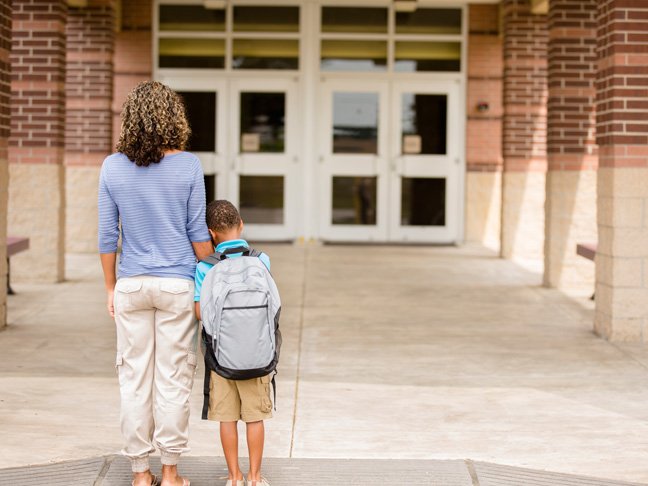Recently, I spoke to a mom of a 6-year-old boy who was feeling overwhelmed by her son’s separation anxiety. Her once active and happy-go-lucky little boy suddenly seemed full of fear and frustration. He fell apart at school drop off every morning. He refused to go to soccer. He didn’t want to play at his best friend’s house. He was clingy, cried often, and had frequent meltdowns before school. She didn’t know what to do.
Although parents are conditioned to believe that separation anxiety is a phase toddlers and preschoolers go through as they learn to separate from parents, separation anxiety can come and go as kids grow. When it affects a child’s ability to get to school or engage in normal daily activities, it is referred to as separation anxiety disorder. Many children, however, go through periods of separation anxiety without developing separation anxiety disorder.
As kids grow, they begin to understand the world around them, and that can create anxiety. Things that weren’t on their radar when they were toddlers, like house fires or car accidents, begin to feel like possibilities. Fear of separating from loved ones during the day (even if it’s just to go to school) and nighttime anxiety can spike as kids attempt to work through these complicated issues and the feelings they experience.
Some amount of worry and anxiety is perfectly normal and kids can learn to cope with these emotions. It’s also natural for parents to worry when kids are crying and clingy at drop off. Despite reassurances that the crying stops when kids are engaged in fun projects, it’s difficult to walk away when your child appears to be in distress.
The good news is that parents can take steps to reduce separation anxiety at any age:
1. Confront your own anxiety. Many parents feel the emotional weight of making sure their kids feel safe and secure during a big transition, such as the first day of school or staying with a new babysitter for the first time. However, it’s important to remember that kids take their cues from their parents. When parents appear to be anxious about saying goodbye, kids sense that there is something to worry about. So if you’re anxious about separating from your child, find your own support system to help ease your own fears.
2. Practice separating from your child. Begin by making a plan to stay with your child at Grandma’s house for 20 minutes and then leave for 20 minutes. This gives your child time to engage in a fun activity and warm up to being away from home. Be honest and prepare your child in advance. Say goodbye when you leave and return in exactly 20 minutes. The next time you practice, stay for a shorter amount of time and leave for a longer period. By desensitizing your child to separating, he learns that he can have fun and feel safe away from his parents.
3. Create a goodbye ritual, such as a secret handshake or a butterfly kiss. Leaving the safety of mom and dad can be overwhelming, and rituals help kids because they know what to expect and when to expect it. You might also consider placing a handwritten note in your child’s lunchbox or snack bag as a reminder that you’re thinking of him. Or, put a special object from home in your child’s backpack to help ease the worry about being away all day.
4. Have a consistent routine at home. Young children are at their best when they have plenty of rest, time to play, and healthy food at mealtime. Healthy habits at home make for a more successful transition out of the home. Create bedtime routines that you and your child can easily implement every night. Make sure that your child has enough time in the morning to eat, get dressed, and attend to daily hygiene habits without the stress of hurrying. Even preschoolers can choose outfits and pack backpacks at night to make the morning routine as easy as possible.
Separation anxiety can be every bit as stressful for the parent as it is for the child. It’s difficult to say goodbye to a tearful child day after day. Take comfort in knowing that most children do adjust to their new surroundings once they internalize the routines and expectations, and it always helps to engage in extra one on one time with your child on the weekends and during vacations to reconnect and bond.
